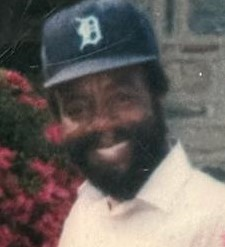Two referrals follow tenacious investigation into potential racially motivated miscarriage of justice


Colleagues and co-defendants: Basil Peterkin (left) and Saliah Mehmet (right)
- The Criminal Cases Review Commission has now referred 11 cases that relied on evidence from disgraced British Transport Police Officer DS Derek Ridgewell
- The latest referrals came after the CCRC tracked down family members of two deceased depot workers blamed for thefts from site DS Ridgewell later admitted to stealing from
- The men’s families have welcomed the CCRC’s referrals in powerful written statements outlining the devastating effect the potentially unsafe convictions had on both men’s lives
TWO men who died with convictions that might be unsafe have had their cases referred back to the courts thanks to a persistent pro-active investigation by the Criminal Cases Review Commission (CCRC).
British Transport Police Officer DS Derek Ridgewell led the case against British Rail workers Basil Peterkin and Saliah Mehmet, who were convicted in 1977 after losses were incurred at a goods depot where they worked in south London. DS Derek Ridgewell and his colleagues DC Douglas Ellis and DC Alan Keeling later pleaded guilty to stealing from the same depot.
The CCRC has carried out a range of investigations into the historical racist and corrupt practices of DS Ridgewell, who fabricated evidence that led to convictions that lasted long after his death in 1982.
Both Mr Mehmet and Mr Peterkin were sentenced to nine months in prison and protested their innocence for the rest of their lives before passing away in August 1991 (Mr Peterkin) and August 2021 (Mr Mehmet).
As part of their arduous investigations into Ridgewell’s crimes, the CCRC tenaciously tracked down the families of the convicted men to let them know of their right to appeal.
This included;
- scouring ancestry and property websites
- reviewing physical records from the National Archives
- considering coroner’s reports
- contacting lawyers from the original case
- seeking information requests from local authorities in order to contact family members
The subsequent review found that the new evidence about DS Ridgewell’s conduct means there is a real possibility both Mr Peterkin and Mr Mehmet’s convictions will be overturned – and both men’s families have welcomed the decision to refer the convictions to the Court of Appeal.
Helen Pitcher OBE, Chair of CCRC said:
“This case is another example of the thorough work the CCRC does to investigate potential miscarriages of justice.
“On top of considering more than 1,400 applications per year, our case review managers have used their investigative powers to track down family members of two men who may have died with unsafe convictions.
“We are continuing work to identify other potential applicants, I urge anyone else who believes that they or a loved one, friend or acquaintance was a victim of a miscarriage of justice to contact the CCRC – particularly if DS Derek Ridgewell was involved.”
In a joint statement, Basil Peterkin’s children Basil, Janice and Lileith said:
“Our father’s conviction was devastating for him and our whole family. He never got over it. He felt such shame that he left his home in the UK to try to start afresh.
“We now know that the officer who arrested our father was found guilty of the very crime he had accused our father and others of committing. That officer was corrupt.
“We want justice and we want our father’s name cleared.”
Saliah Mehmet’s children Regu, Arda and Onur said:
“After fleeing war in Cyprus, our father started a family in this country. This conviction left him a changed man who never again trusted the police.
“It had a traumatic effect on our mother and our whole family for decades, including making us homeless.
“We are pleased and relieved that this case is going to the Court of Appeal. The behaviour of Ridgewell was atrocious, and we are hopeful that our father’s name will finally be cleared.”
Background to the convictions
Saliah Mehmet and Basil Peterkin were two of 12 people who stood trial at the Central Criminal Court in April 1977. All apart from one were employed by British Rail at the Bricklayers Arms’ Goods Depot in south London. They were accused of stealing by re-labelling parcels to direct them to alternative addresses, and then selling the goods that were inside.
Mr Mehmet was convicted of conspiracy to steal, handing stolen goods, and two counts of theft, and Mr Peterkin was convicted of conspiracy to steal. In total eight people on trial were found guilty and four were found not guilty. Both men were convicted to nine months in prison.
The defendants all claimed that the items found in their possession had been planted, and that any admissions said to have been made by them had by fabricated by the police.
The case was led by DS Derek Ridgewell, a British Transport Police officer who was appointed to investigate the depot along with colleagues DC Douglas Ellis and DC Alan Keeling. The three officers later pleaded guilty to stealing from the same depot and were sentenced to seven, six and two years in prison respectively. The three officers were said to have joined forces with a group of men to steal £364,000 worth of property from the depot.
The CCRC has made references to the Court of Appeal previously in cases where the credibility of DS Ridgewell was central to the prosecution case. To date, all nine convictions referred back to the court have been quashed. Anyone else who believes they might be a victim of a miscarriage of justice, convicted in a case involving Derek Ridgewell, is urged to contact the CCRC.
ENDS
This press release was issued by the Communications Team, Criminal Cases Review Commission. They can be contacted by phone on: 0121 232 0900 or by email: press@ccrc.gov.uk.
Notes to Editors
- The Peterkin and Mehmet family are represented by Matt Foot (Birnberg Peirce Solicitors).
- The Court of Appeal quashed the following convictions on the basis of the conviction of DS Ridgewell as new evidence:
- Mr Stephen Simmons
- Four men referred to as the Oval 4
- Four of the six men referred to as the Stockwell 6. One man was acquitted at trial and one has not been successfully traced.
- The CCRC is an independent body set up under the Criminal Appeal Act 1995. It is responsible for finding and independently reviewing suspected and alleged miscarriages of criminal justice in England, Wales and Northern Ireland. It is based in Birmingham and is funded by the Ministry of Justice.
- There are currently 11 Commissioners who bring to the CCRC considerable experience from a wide variety of backgrounds. Commissioners are appointed by the monarch on the recommendation of the Prime Minister in accordance with the Office for the Commissioner for Public Appointments’ Code of Practice.
- The CCRC receives around 1,400 applications for reviews (convictions and/or sentences) each year. Since starting work in 1997, the CCRC has referred around 3% of applications to the appeal courts.
- The CCRC considers whether, as a result of new evidence or argument, there is a real possibility that the conviction would not be upheld were a reference to be made. New evidence or argument is argument or evidence which has not been raised during the trial or on appeal. Applicants should usually have appealed first. A case can be referred in the absence of new evidence or argument or an earlier appeal only if there are “exceptional circumstances”.
- If a case is referred, it is then for the appeal court to decide whether the conviction is unsafe or the sentence unfair.
- More details about the role and work of the Criminal Cases Review Commission can be found at www.ccrc.gov.uk. The CCRC can be found on Twitter at ccrcupdate.
